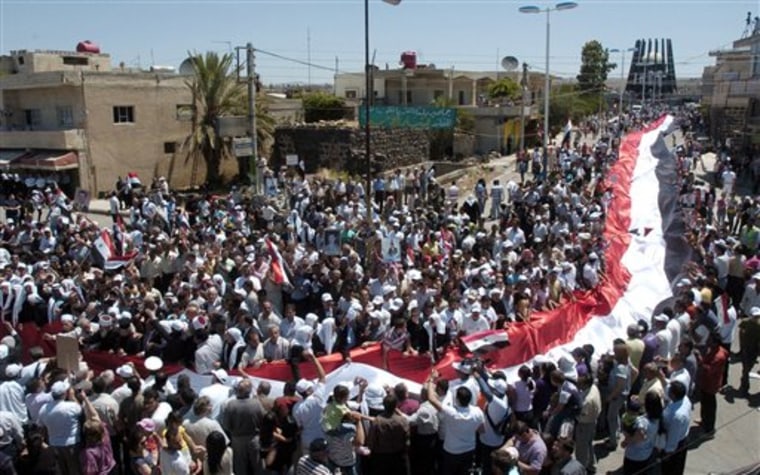Syrian President Bashar Assad sacked the governor of a key central city in the latest attempt to appease an uprising against his authoritarian rule.
The move, announced by the state-run news agency SANA, was seen as the latest attempt by Assad to weed out potential weak links in his ruling system and possibly signal a renewed crackdown on the city. The statement gave no details or reason for the sacking.
Hama has seen one of the deadliest government crackdowns during more than three months of protests against the Assad family's 40-year dynasty.
The president has offered vague promises of reform while unleashing his army and security services the crush the protests. The growing death toll has fueled the uprising.
Activists say the regime has killed more than 1,400 people — mostly unarmed protesters — since mid-March, but the government disputes that toll.
On Friday, hundreds of thousands of protesters flooded cities around Syria in what activists described as the largest outpouring against the regime and a powerful message of the opposition's resolve.
At least 24 people were killed in various clashes, activists said.
The rage — flaring in dozens of places at the same time — further strained the resources of Assad's security forces and military as they also try to choke off a refugee wave into Turkey.
The centerpiece of the latest protests — the central city of Hama — brings further complications for the government. Security forces moved outside Hama in early June after shootings that left 65 people dead, and now the streets appear fully under the sway of the opposition with at least 200,000 people gathering Friday in the central square, activists said.
Crowd estimates and other details could not be independently verified. The Syrian government has banned most foreign media from the country and restricted coverage.
But the protest surge Friday appeared to dwarf recent weeks as Assad's forces tried to wear down the opposition with relentless force. Syrian rights groups say more than 1,400 people have been killed, most of them unarmed protesters, since mid-March.
The regime disputes the toll, blaming "armed thugs" and foreign conspirators for the unrest that has posed the most serious challenge to the Assad family's 40-year ruling dynasty in Syria.
Encouraged by the widening protests, prominent opposition figures plan to convene a 'national salvation' conference in Damascus on July 16 to reach a broad based blueprint for solving Syria's political crisis.
"In light of the military solution chosen by the regime to end the revolution, the conference aims to reach a consensus guided by the popular protest movement for a transitional period and a national salvation government that lays the foundation for a new constitution and free elections," said a statement by the organizers, which was sent to Reuters.
The statement was signed by 50 figures, including Kurdish leader Mishaal al-Tammo, former judge Haitham al-Maleh, Nawaf al-Bashir, a tribal leader from the eastern province of Deir al-Zor, economist Aref Dalila, a fierce critic of the Assad's family's involvement in business and Walid al-Bunni, a physician who played a major role in a movement for democracy crushed by Assad ten years ago known as Damascus Spring.
In Hama, anti-government crowds defiantly staked their claim to the city — which carries important symbolism to the opposition. In 1982, Assad's late father, Hafez Assad, stormed the city to crush an uprising, leaving between 10,000 and 25,000 people dead, rights groups say.
as saying at least 200,000 protesters were at the Hama rally, held in the central square around a giant clock tower.
Syria-based activist Mustafa Osso put the Hama rally crowd at 300,000 and told The Associated Press that there was no sign of security forces, which remained outside the city and appeared unwilling to risk major bloodshed again.
The absence of security forces in Hama also could reflect fatigue in Assad's core troops and the need to concentrate on what officials consider strategic fronts. Assad's elite forces have waged nearly nonstop crackdowns around the country as new protest hotbeds emerged.
Now, they are mobilized in difficult terrain along the Turkish border in efforts to clamp down on refugees fleeing across the border. The regime is deeply embarrassed by the exodus and also fears the camps could become opposition enclaves out of the government's reach.
"Syrian security forces are exhausted," said Osso. "There are demonstrations all over Syria and they cannot cover these areas."

In Lithuania, U.S. Secretary of State Hillary Rodham Clinton called on Assad's regime to either begin a credible political reform process or "continue to see increasingly organized resistance."
"It doesn't appear that there's a coherent and consistent message coming from Syria," Clinton told a news conference. "We know what they have to do. They must begin a genuine transition to democracy and allowing one meeting of the opposition in Damascus is not sufficient action toward achieving that goal."
Osso said huge protest crowds moved into the streets after the Muslim noon prayers in places across the country, including the capital Damascus. Some carried red cards to copy the "send off" signal by soccer referees.